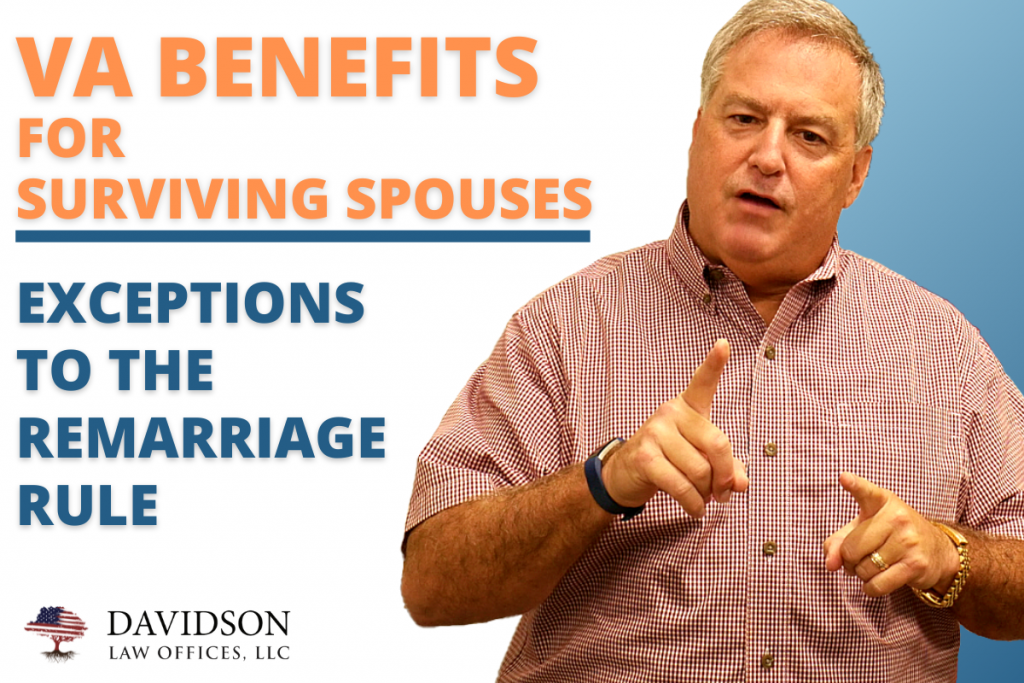We’ve had a lot of comments and questions on one of recent spousal benefits videos, so I wanted to take this opportunity to provide a little refresher course. Everyone is concerned about their spouse if something happens to them — especially Veterans. Most Veterans feel like they’re going to be okay with the benefits they’re receiving, but they’re worried about their spouse.
To qualify for Veteran surviving spouse benefits, you have to be able to prove that you were the valid or deemed spouse of the Veteran at the time of the Veteran’s death. If you’re not the spouse at the time of the Veteran’s death, you’re not entitled to Veteran surviving spouse benefits. Furthermore, you must satisfy the following requirements:
1) You have to have been married to the Veteran for at least a year prior to his or her passing.
2) You have to have had continuous cohabitation with the Veteran during the marriage.
3) You can’t become remarried after the Veteran’s death.
These are the general rules to qualify for Veteran surviving spouse benefits, but there are exceptions to that third remarriage condition. As a general rule, divorce nullifies any possible Veteran surviving spouse benefits. But what about remarriage? Do you always lose your Veteran surviving spouse benefits if you remarry after the Veteran’s death? Below we’ll discuss a few exceptions that may apply to you.
Exception #1
Unlike the other exceptions listed below, this one is pretty simple. If the surviving spouse gets remarried after the Veteran’s death but the marriage is deemed void or annulled, then it’s as if the remarriage never existed. In this case, the spouse would be eligible for Veteran surviving spouse benefits. The important thing to remember here is that the marriage must be voided or annulled.
Exception #2
This second exception is very specific and I’ve never seen a case where this applies in my many years of helping Veterans. But it is possible and there is surely a reason this exception exists. This rule says that Veteran surviving spouse benefits may be available if the remarriage was terminated prior to 1990. This is a 32 year old law that is only going to be relevant in very limited cases.
This exception would only apply if the Veteran’s surviving spouse filed a claim for benefits prior to 1990, but the claim was never adjudicated. I find it really hard to believe that there is still a 32 year old claim pending. But if that’s the case, this older law would be relevant. You could use this law to challenge the VA and say it was perfectly fine for you to be remarried because you were still waiting on your claim to process.
Under the current law, the surviving spouse is only eligible for Veteran surviving spouse benefits if the remarriage ended (exception #1). This law provides that the surviving spouse may be eligible for Disability Indemnity Compensation (DIC) or have DIC reinstated if the remarriage ended in divorce, annulment, dissolution, or death of the second spouse. Also if you were never legally remarried and were just cohabitating, you would still be eligible for Veteran surviving spouse benefits.
But because of the effective date provisions of this law, no surviving spouse that qualifies can obtain retroactive DIC earlier than 1998. So if you had filed for benefits and this exception applied, you can’t receive retroactive benefits prior to October 1, 1998. In addition to DIC, the surviving spouse could be eligible for CHAMPVA, Dependent Educational Assistance (DEA), and VA home loans.
Exception #3
The third exception to the remarriage rule is even more specific than the second exception. If the surviving spouse is at least 57 years old when they remarried, they may still qualify for Veteran surviving spouse benefits. Remarriage had to be on or after December 16, 2003 and the claim for benefits must have been pending or filed on or after January 1, 2004. You can now see just how narrow this exception is. It only covers spouses who remarried after turning 57 and whose claim is still pending.
Remarriage doesn’t have to be terminated for these spouses to be eligible for Veteran surviving spouse benefits. They can remain remarried and are still entitled to benefits based upon their earlier marriage to the Veteran. Benefits they could receive include Disability Indemnity Compensation (DIC), CHAMPVA, VA home loans, Aid & Attendance (VA Pension), and Dependent Educational Assistance (DEA).
Contact Us So We Can Help!
These exceptions for Veteran surviving spouse benefits can be quite complicated. The general rule is that remarriage cancels any surviving spouse benefits, but there are always exceptions that may apply. If you are the surviving spouse of a Veteran and are worried about an impending marriage canceling your benefits, please contact us so we can help. You can complete this form or give us a call at (229) 226-8183. You can also send us an email to dearvaguy@gmail.com.
If you’d like to see this blog in video format, you can watch it below. Please be sure to SUBSCRIBE to our YouTube channel and click the bell notification button so that you’re notified each time we publish a new video.

